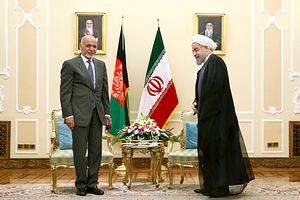Tension between the United States and Iran is again on the rise after the United States withdrew from the Iran nuclear deal — formally the Joint Comprehensive Plan of Action (JCPOA) — and the Trump administration threatened to impose the strongest sanctions in history on Iran. The threat was supplemented with U.S. Secretary of State Mike Pompeo’s wishful 12-point laundry list to make Iran obey. Pompeo’s expressions were inferred by many experts as a recipe for regime change in Iran, but he later expressed that the sanctions are not aimed at regime change but at a change in behavior.
Iran has responded in a similarly harsh tone, with Iranian President Hassan Rouhani saying, “The world today does not accept that the United States decides for the world. Countries have their independence… Who are you to decide for Iran and the world?”
Washington’s withdrawal from the Iran nuclear deal is not good news for Afghanistan, as Iran has the ability to influence the security and economic situation in its neighbor.
In this context, the U.S. withdrawal from the deal and the threat of imposing sanctions on Iran will harm Afghanistan for three main reasons. First, Iran will push to worsen the security and economic situation in Afghanistan by supporting the Taliban insurgency. Second, Afghanistan will become more dependent on Pakistan economically and Pakistan will gain more leverage over Afghanistan in terms of negotiating a peace settlement with the Taliban. Third, the regional consensus against Afghan-led peace will strengthen.
With the U.S. withdrawal and new sanctions, it is likely that Iran will increase its relations with the Taliban, contributing to worsening the security situation in the vulnerable provinces of Afghanistan’s west and northwest, particularly Farah, Herat, Badghis, and Faryab.
Iran enjoys a fair proportion of the Afghan consumer market that it would not like to give up on, especially when it is under harsh sanctions and in dire need of balancing its economy. However, it is valid to argue that Iran would be willing to give up on small gains to secure big ones. This means that by giving up on its share of the market in Afghanistan, Iran will pressure the Afghan government to bow down to the regional vision of a power-sharing deal with the Taliban to end the Afghan conflict.
By contributing to the worsening security and economic situation, Iran will be able to secure its three core interests in Afghanistan. First, it will be able to dent the American claim the U.S. South Asia Strategy is a success; second, it will seriously threaten economic projects like the Turkmenistan-Afghanistan-Pakistan-India (TAPI) pipeline project and Bakshabad Dam that it deems a threat; and third, Iran will contribute to emerging Shia-Sunni tensions by supporting conservative Shia groups that could lead to a renewed rivalry between Iran and Saudi Arabia in Afghanistan.
As far as Pakistan is concerned, Afghanistan hoped to utilize Chabahar Port in Iran to gain access to international markets, bypassing Pakistan’s Karachi. The new sanctions that would be introduced could threaten this vital economic project and Afghanistan will have to lean on Pakistan to access the sea for economic purposes.
Pakistan has been under immense pressure for harboring terrorist sanctuaries and sponsoring terrorism. The Trump administration has cut aid, lobbied to put Pakistan on the Financial Action Task Force grey list, and publicly asked Pakistan to stop cooperating with terrorists and support the Afghan-led peace process. In addition to that, the government of Afghanistan has also lobbied for more pressure on Pakistan so it can push the Taliban to the negotiating table.
The United States’ withdrawal from the Iran nuclear deal and introduction of new sanctions will release the pressure on Pakistan and it will gain more leverage over Afghanistan and the United States, both economically and politically in the context of Afghanistan.
Lastly, the regional consensus on peace in Afghanistan has been turning against the United States and in favor of the Taliban. Russia, Pakistan, and Iran assert that the Afghan problem is not solvable through military means and a settlement needs to be negotiated. While the Afghan government has offered a peace deal with political inclusion for the Taliban, the regional stance can be inferred as arguing for a power sharing deal to end the Afghan conflict. As the United States supports an Afghan-led, Afghan-owned peace process, it supports the inclusion deal offered by the Afghan government, excluding the outright power sharing option for the Taliban.
Donald Trump’s approach to Iran completely contradicts his South Asia Strategy, which is centered on Afghanistan. Like his tweets, his recent actions on Iran can be interpreted as either a spur of the moment decision or something more serious — he is either playing a deterrence game or is up to something darker, like regime change or regime disruption. In the context of Afghanistan, the United States’ success depends on showing sticks to some regional players and carrots to others, like Pakistan and Iran. It would be extremely tough for the United States to achieve success in Afghanistan if it shows sticks to all parties involved in the Afghan conflict.
Sibghatullah Arsalai is a Senior Political Expert at the Office of the National Security Council of Afghanistan. He is also a fellow at the Kabul Center for Policy and Strategy, having a specific interest in the areas of peace, security and geopolitics. The views expressed in this piece are his own.

































